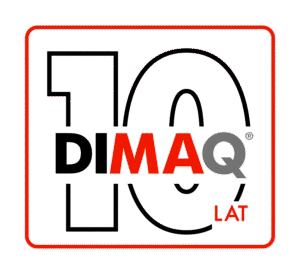A conversation on education in e-marketing, certification of skills, and the process of continuous acquisition of knowledge with Artur Maciorowski – a DIMAQ trainer and the Deputy Chairman of IAB Polska’s Sector Skills Council.

Artur Maciorowski, DIMAQ trainer
How can you become an expert in the area of digital marketing?
Artur Maciorowski: Surely by combining practical competence gained from completed projects and online campaigns with a thorough knowledge in the area of e-marketing. And nowadays it’s increasingly harder to be an expert in each single area of interactive marketing and boast the status of an expert in each single field of digital marketing.
Why is it so?
The internet is developing at a great pace and in many dimensions. 20 years ago, back when I was taking my first steps in an interactive agency, online advertising communication was only budding. When people talked about banners, they would usually mean outdoor advertising, not digital. Today, according to IAB AdEx, the market of online advertising in Poland reaches nearly 4 billion zloty of worth per year, the situation has changed completely. Almost 1/3 of our advertising budgets are spent online, which explains the growing need for knowledge and competence required to plan online promotional activities effectively. In recent years we have seen some dynamic changes related to mobile, social media or marketing automation.
Can we say then that there are not enough digital marketing specialists in the market?
Definitely. Media houses and agencies look for professionals, and clients – both small and large businesses – often develop their own in-house competence. There is a growing demand for specialists and experts both in the area of digital marketing and in narrow, specific fields of e-marketing.
An e-marketing expert or a specialist in some particular area of the digital, such as SEO or social media – what to go for?
That’s an absolutely crucial question. The choice often determines our career path. I believe that regardless of the final choice, it’s important to be knowledgeable about every area of digital marketing. An extensive expert knowledge lets us move easily in the market and talk with representatives of media houses, agencies or suppliers of technological tools. This works in favour to making good decisions regarding collaboration, running campaigns, project implementation or platform selection. It also acts as a foundation that lets us follow an expert’s path and develop as a SEO or social media expert or media planner.

The choice often determines our career path.
So how to start the process of education and choose the right option?
The offer of education opportunities is very broad, but also inconsistent. We have 10-15 training companies in the market, offering workshops in different fields of e-marketing – from technical issues such as SEO, Google Analytics or Google Ads to ‘soft’ matters like content marketing, online campaign planning or social media. We also see more and more industry events each year – conferences, congresses or seminars, where usually practitioners share their knowledge with others. Interactive entities organise also education meetings for potential clients. The offer is complemented by postgraduate studies. But the biggest challenge is to ensure a high standard and quality of teaching, which is the most important thing we need to consider when making our decision.
Is it possible to verify one’s digital competence to be sure of its level? If so, how?
The choice basically boils down to two options. The first option is certification offered by such industry tycoons as Google or Facebook, but this applies to their own tools only. The second – and, as I deeply believe, the best – option is the DIMAQ test of competence and knowledge about digital marketing. The programme, initiated by the Polish branch of IAB in 2015, has so far drawn as many as 1,000 specialists willing to test their skills. There are further 9 European countries that have already adapted and implemented this concept locally, like Greece, Slovenia or Serbia. The whole programme has been accredited by IAB Europe, and is compliant with the Polish Qualifications Framework and the European Qualifications Framework alike.

DIMAQ has so far drawn as many as 1,000 specialists willing to test their skills.
Who can take a DIMAQ examination and what knowledge do you need to get the certificate?
Virtually anyone active in – or intending to enter – the digital marketing market can take the examination. The exam itself is quite a challenge, mainly because it requires a broad knowledge in 12 fields of digital marketing and e-commerce. That’s why the suggestion is to take the time to prepare oneself well to the knowledge test, be it on one’s own or through taking part in dedicated training programmes.
Who are the people taking part in training programmes?
Training programmes bring together both the supply side of the market, meaning employees of digital agencies or specialists in certain areas and people from media houses – not only from digital teams. At present, when we have so many cross-platform projects, digital competence is a must! DIMAQ is also a chance to transform the publishing market, hence the huge interest in the programme among the media monitoring the transfer of advertising budgets from printed to online press. To me, the most interesting phenomenon is the growing popularity of DIMAQ programme and certificate among marketers. My training sessions bring a very broad sort of people together – from e-marketers to traditional marketers holding various executive, managerial or specialist positions. We’ve even had interns and students of economic universities take part in such training programmes.

At present, when we have so many cross-platform projects, digital competence is a must!
Why marketers?
For several reasons. First of all – they make key decisions regarding spending on advertising. Without a fundamental knowledge and essential practical skills, the risk of bad decisions increases. Second thing – digital marketing teams grow at the cost of traditional teams on the client’s side. And lastly – e-marketers expect the market to be competent as well. This makes media houses and agencies start getting an increasing number of briefs with questions about the competence of the members of their teams, and even specifically about DIMAQ-certified professionals. This is probably why I saw a couple of representatives of a media house attending a training session I ran some time ago. We shouldn’t be surprised to see DIMAQ certification among the requirements in job postings more and more often either. A DIMAQ certificate is, after all, gives HR directors and team leaders a guarantee of a high level of digital competence. Anyway, DIMAQ programme is addressed to almost anyone – there are even people from sales, procurement or HR departments. As well as business directors and presidents who need to acquire competence to manage e-marketing teams.
Who are the current holders of DIMAQ certificates?
The DIMAQ community is composed of people with a background in media houses, agencies, publishing companies, websites, and a strong representation of marketers – active in both online and traditional environments. I think that DIMAQ has a great potential to transform the market digitally since it is the only programme to take the Polish market reality into consideration and verify the practical knowledge required in e-marketers’ everyday practice. And I’m talking about the programme in general because passing the exam and obtaining the certificate is just the first step. The certificate has a valid-thru date, so to speak, which encourages its holder to keep on improving their competence by collecting the so-called recertification points. It’s a guarantee of lifelong learning. And it is extremely important since there’s possibly no other industry that develops so dynamically as that based on new technology. And so, like doctors or pharmacists, contemporary e-marketers need to be in the swim and update and develop their skills on an ongoing basis.
How much time, involvement, and effort do you need to put into the preparation for the exam to pass it?
Much depends on our individual competence and experience. If I were to suggest an almost 100% proven way to pass the exam, I’d say it would be to take part in a dedicated 4-6-day training session and spend 1-2 weekends revising on your own. Those who can already boast a high level of digital competence and practice could use a 1-day FastTrack to get to know the specificity of certification and discuss the key issues regarding self-preparation. It’s important to bear in mind that the exam questions are formed by digital professionals – working groups led and managed by IAB. But anyone can see which option suits them best by solving a test with 15 sample questions, which is available at Dimaq.pl upon registration.
Artur Maciorowski – Deputy Chairman of the Sector Skills Council at IAB Polska | DIMAQ, trainer, consultant, and feature writer active in the area of e-marketing. Involved in the online industry since 1998. As the owner of eCode, a consulting-training company, he educates other professionals as well as designs and offers consultation in the area of digital strategies in the field of promotion and sales activities. A certified IAB DIMAQ trainer, a teacher at SGH Warsaw School of Economics and AGH University of Science and Technology, and a CIM “Digital Strategy” tutor at Questus. A graduate of the UK Chartered Institute of Marketing’s „Diploma in Professional Marketing” and of “IBM Application framework for e-business” course completed in Zürich. Managing Editor of “Online Marketing Polska” and “Social Media Manager”. Author of: “E-marketing w Praktyce. Strategie skutecznej promocji online” [EN: “E-marketing in Practice. Effective Online Promotion Strategies”], “Skuteczny e-mail marketing” [EN: “Effective E-mail Marketing”], and co-author of “Wskaźniki marketingowe” [“Marketing Indicators”] and “Biblia e-biznesu 2” [“The Bible of E-business 2”].
The text originally appeared HERE.
